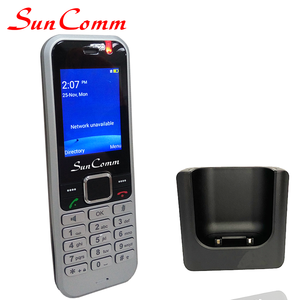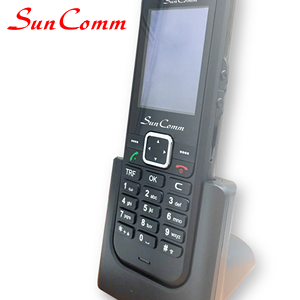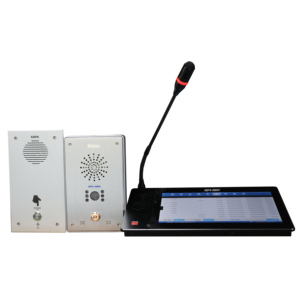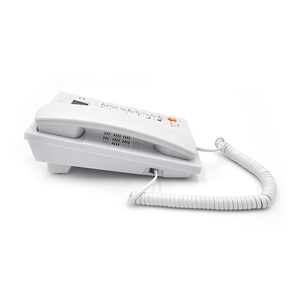(921 products available)













































































































































































































An intercom desk phone connects different rooms or workspaces via a system of interconnected communication devices. Desk intercom phones come in several types, which include;
Traditional Analog Intercoms
These systems use analog wiring to connect intercoms in different offices or rooms. They are easy to operate and ideal for smaller buildings or homes. However, traditional intercoms have limited features and, thus, may not meet the communication needs of many businesses.
Digital Systems
These intercoms use digital communication technology, so users get clear audio and video. They have additional features, like call recording and group calling. Digital desk phones give users a better audio experience than traditional analog phones. However, they have a higher upfront cost compared to their analog counterparts.
VoIP Intercoms
The Voice over Internet Protocol connects intercoms via the internet or private networks. VoIP desk phones allow seamless integration between the intercom and other systems, like customer relationship management (CRM) tools. They also provide great flexibility because users can make calls from smartphones and laptops. But companies should be aware of potential security risks, such as hacking and phishing.
Wireless Intercom Systems
These modern desk phones use radio waves to connect intercoms in different workspaces. As a result, they are easy to install and perfect for old buildings with no wiring. Also, users can communicate via mobile apps. However, within-the-building wireless intercom systems can have limited range and signal issues.
Intercom Systems with Call Recording
This desk phone offers all the features of a digital intercom. Plus, it has a call recording feature that allows businesses to keep phone conversation records. These recordings help companies resolve disputes and train staff. The surveillance desk phone with call recordings also boosts customer service. This is because call recordings make it easy for supervisors to assess and improve agents' performance.
Intercoms with Mobile App Integration
These intercom systems have features that allow seamless addition or integration with mobile apps. This gives users easy access to the intercom system via their mobile phones. More importantly, users can answer calls from any device, providing flexibility and allowing calls from remote workspaces.
Desk intercom phones are two-way communication devices designed to connect different rooms and offices within a building. They are very useful tools for enhancing communication in workplaces, factories, hospitals, and schools, among other institutions. These intercoms are easy to install and use. They have unique features that differentiate them from conventional phones. They include;
Large Facilities and Enterprises:
Organizations in various industries use intercom phones to talk between offices, reception areas, and conference rooms. Intercom phones improve collaboration and speedy decision-making by making it easier to reach colleagues and teams across different areas.
Manufacturing Plants and Warehouses:
Intercom phone systems help workers communicate in large manufacturing plants and warehouses. The loud phone receivers allow users to work with intercoms even in noisy production areas or during shipping operations. Users can report issues, request help, or provide instructions to enhance efficiency and safety in industrial work settings.
Health Care Facilities:
Hospitals, clinics, and other healthcare facilities use intercom desk phones to enhance communication between different departments, receptionists, and healthcare workers. The systems can quickly connect calls in emergency situations and facilitate patient supervision. They have features like call recording and encryption to protect sensitive patient data.
Security and Monitoring:
The intercom desk phone can be used with security devices like CCTV cameras, door sensors, and access control systems. Users can monitor secure areas from a distance and have two-way conversations with visitors through VoIP intercoms. Some models send alerts to the desk phone when there are security breaches.
Educational Institutions:
Schools and universities use intercom phones for communication between faculty, administrative staff, and security personnel. They can connect to different rooms and offices to discuss issues relating to students and staff. The systems also help in monitoring campus security.
Real Estate and Property Management:
Intercom desk phones enhance communication in large residential buildings, offices, and commercial properties. They can be connected to entry doors, allowing receptionists to identify visitors before granting them access. They also facilitate easy communication between tenants and property management staff.
Scalability:
When choosing intercom desk phones, consider the system's scalability. It will allow users to increase or decrease the number of desk phones according to the needs of the organization. Selecting a scalable intercom system can save money and make switching providers easier.
Compatibility:
When choosing an intercom desk phone, be sure to choose one that is compatible with existing infrastructure, devices, and communication systems.
Features and Functionality:
Businesses should identify critical desk phone features to enhance communication needs. Intercom desk phones offer various features like call forwarding, three-way calling, voicemail, and other essential functions.
Ease of Installation and Maintenance:
Business owners should consider the installation process of intercom desk phones. Some intercom systems require professional installation, while others can be easily installed. Additionally, choose a system that can be maintained with little effort to avoid downtime and ensure its continued operation.
System Type:
Intercom desk phones are essential in ensuring effective and seamless communication in an organization. However, before settling on one, it is important to understand its pros and cons. Traditional wired intercom systems are installed with cables. Wired intercom systems offer reliable and clear communication. They are often installed in buildings with many desks/ offices and interconnected by cables. Although wired intercom systems provide seamless communication, they can be expensive to install and lack flexibility. Moreover, if damaged, these systems may cause communication disruption. Wireless intercom systems often use Wi-Fi or DECT technology to connect desk phones. These intercom systems are flexible and easy to install, hence a great choice for businesses looking for affordable options. However, wireless intercom systems may face connectivity problems, which can impact communication reliability.
Budget:
When choosing intercom desk phones, businesses should prepare a budget specifying how much they are willing to spend. Consider the cost of purchasing desk phones, installation, and maintenance costs. Analyzing the total cost of ownership will help businesses identify a phone system that is both affordable and meets communication needs.
Vendor Reputation:
Vendor reputation is an important factor to consider when choosing an intercom desk phone. Check whether the vendor has positive reviews and offers reliable customer support. These can help businesses make an informed decision when selecting a vendor.
Q1: What is an intercom desk phone?
A1: An intercom desk phone is a communication device installed within a building or office to facilitate internal conversations. Depending on the model, it may have intercom features like a speaker, microphone, and keypad. It can connect to a telephone line to make external calls.
Q2: What are the benefits of using an intercom desk phone?
A2: This communication device helps improve communication within an organization. Employees can quickly reach out to each other without leaving their desks. The intercom system is cost-effective since it reduces travel expenses, and some models can connect to a telephone line. Enhancing security is another benefit of using an intercom desk phone. Gatekeepers can communicate with staff and discern visitors before granting access.
Q3: How can buyers choose the right desk intercom phone?
A3: Consider the features and functions of different intercom models. The features can include a caller ID, built-in answering machine, hands-free calling, and Bluetooth connectivity. These features enhance the user experience and offer additional functionality. Consider the number of extensions the device supports and the power source. Gauge the sound quality, durability, and ease of installation and use.
Q4: Can intercom desk phones be used with a computer?
A4: Some intercom desk phones can be used with a computer. However, it depends on the model. For instance, intercom desk phones that use Voice over Internet Protocol (VoIP) technology can be connected to a computer. Users can make calls through the intercom system using their telephone line or as part of a telecommunications service.